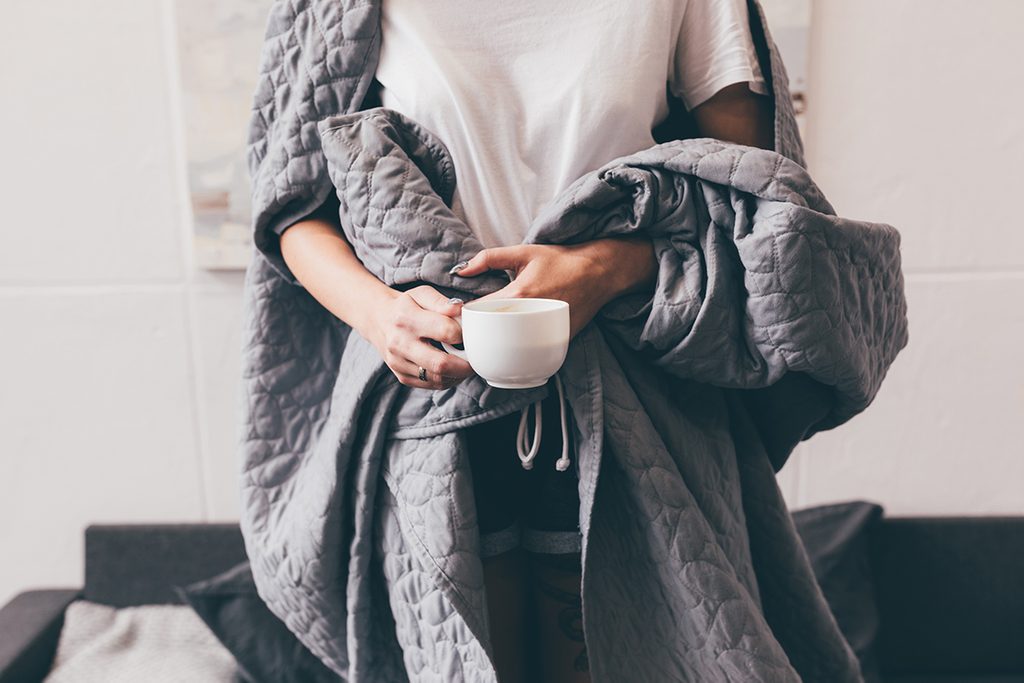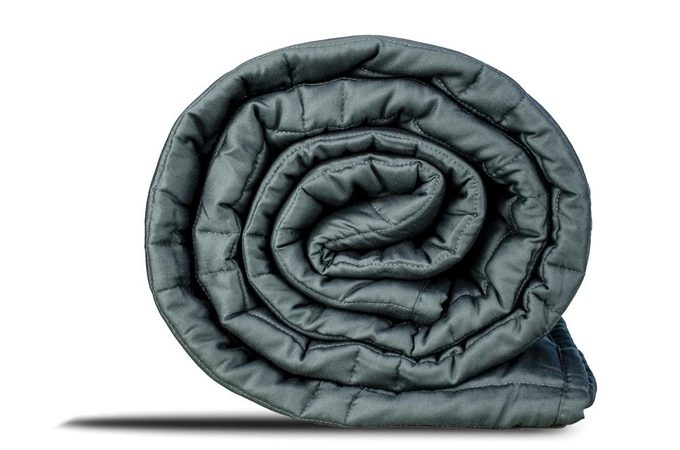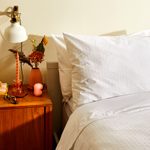Can a Weighted Blanket with Cooling Tech Help Me Sleep (and Not Over-Heat)?

I tried a weighted blanket with cooling tech to see if it could soothe my pandemic anxiety.
I’ve never been the greatest sleeper. I’m anxious and prone to overthinking. I get sweaty at night and tend to throw my blanket onto my poor partner in the middle of the night. This all became worse when the pandemic hit, and my anxiety went into overdrive.
I’m not alone in this experience. A recent study conducted in China found people had higher rates of insomnia, acute stress, anxiety, and depression in the wake of the pandemic. Notably, the data showed a 37 percent increase in the rates of clinical insomnia since the beginning of the pandemic.
(Related: Do You Have Morning Anxiety?)
When I was asked to test drive Toronto-based Gravid’s 3.0 weighted blanket with cooling technology, I was a bit skeptical. Previously, I had tried a weighted blanket but didn’t like it because of how hot I got and how unevenly distributed the weight was. And to be honest, pre-pandemic, I didn’t think of myself as someone with serious enough sleep issues to need a weighted blanket. But now, the possibility of more sleepless nights, without overheating, was incentive enough to at least try a different product that might help.
Weighted blankets are therapeutic blankets that weigh anywhere between 5 to 30 pounds. The weight, which is distributed throughout the blanket using glass beads, grains, or plastic pellets, provides deep pressure stimulation all over your body. This is thought to trigger your parasympathetic nervous system and help you relax by slowing down your heart rate.
(Related: How to Tell If Your Anxiety is “Normal”)
It’s the general feeling of calm, similar to the sensation of being hugged or swaddled, that helps users fall asleep. So, they’ve long been recommended for patients with anxiety or sleep disorders. One study, published recently in the Journal of Clinical Sleep Medicine, found that weighted blanket use resulted in better sleep, more daytime activity, and reduced daytime symptoms of fatigue, depression, and anxiety. Plus, in the 12-month follow-up period, study participants who continued to use weighted blankets maintained the positive effect on sleep.

The blanket I tried weighs 15 pounds, about 10 percent of my total weight, which is how heavy experts suggest the blanket be. The first time I tried it, I was hooked. The comfort was instantaneous—it felt like I had just wrapped someone’s arms around me. I was still a little apprehensive about how it would fare at night, but after a few weeks of sleeping with my weighted blanket, I now sleep through the night, fall asleep quicker, and wake up feeling a lot more rested.
(Related: What Your Sleep Problems May Be Telling You)
The EcoBreeze Cooling Cover also does its job. The cover is made from Tencel Lyocell, which is made from tiny eucalyptus tree fibres that are hydrophilic (meaning they attract water). This makes the fabric better at absorbing water and keeping users dry than other materials like cotton or polyester. I stayed cool all night.
The price-point is a little steep ($169 for the 15-pound twin-sized blanket), especially if you add the cooling cover ($79). But, the higher price point was worth it for me to regain some normalcy to my sleep cycle— especially when compared to my bad experience with a weighted blanket at a lower price point. And, as a bonus, I’m free from damp, sweaty nights.




